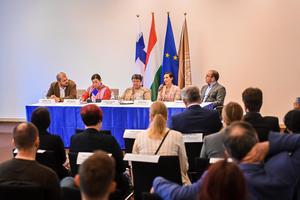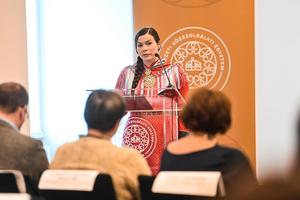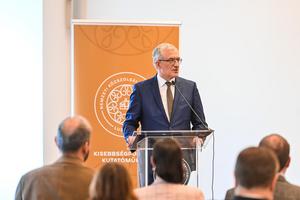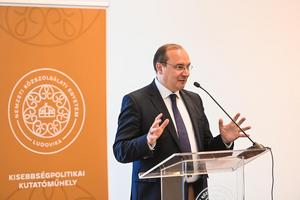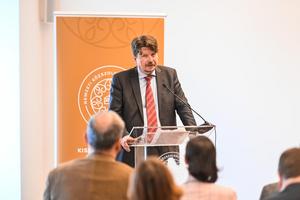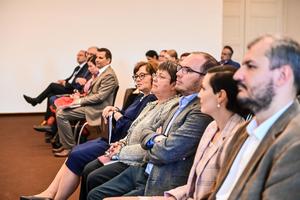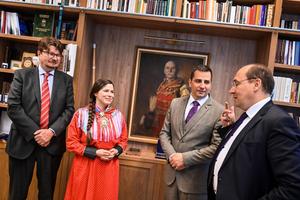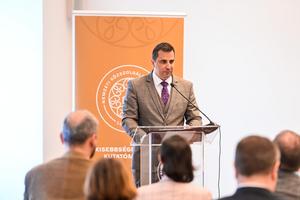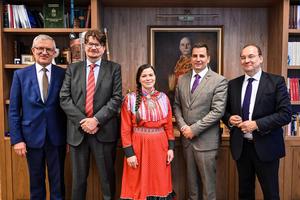Who are the indigenous Sámi people in Northern Europe? What minority rights do they have? What are they doing to preserve, exercise and develop their cultural and linguistic rights? How do they seek to gain influence in the political decision-making that concerns them? What are their problems? The international conference “Indigenous Sámi People in Northern Europe”, jointly organized by the Minority Policy Research Group of the University of Public Service (UPS) and its Finnish partners - of the Finnish Embassy and FinnAgora in Budapest and the Finnish Presidency of Barents Euro-Arctic Council - on May 18, 2023 sought answers to these questions.
One of the main goals of the University is internationalization. An important framework of this effort is to build relationships between faculties, institutes and research groups, to learn about other approaches and solutions, which create the opportunity for mutually inspiring cooperation between foreign partners and domestic intellectual workshops – emphasized rector Gergely Deli in his welcoming speech.
During the introductory part of the event, H. E. Pertti Juhani Anttinen, the Finnish ambassador in Budapest, thanked the Research Group for its cooperation and emphasized the openness of the Finnish Embassy and FinnAgora (cultural institute) in promoting further scientific and cultural cooperation, and in building relations between UPS and Finnish universities.
Finland's minority policy is exemplary in Europe with regard to the indigenous Sámi people living in the country and the Swedish-speaking population of Finland, who make up nearly 5% of the population – said rector's advisor Iván Gyurcsík, head of the Minority Policy Research Group, in his opening speech. Among the aims of the Research Group is the presentation of European research, developments and solutions related to minority policy to domestic experts and interested parties. That is why the Group was very happy to welcome the initiative of Jari Vilén (Finnish Ambassador to Budapest 2007-12), chairman of the Finnish Presidency of the Barents Euro-Arctic Council (https://barents-council.org/) 2021-23, to invite Anni Koivisto, vice president of the Sámi Parliament in Finland to Hungary. This is how the first English-language international conference of the Research Group came to be organized, with Finnish cooperation.
This event is a historic one – declared Ambassador Jari Vilén – since in the history of the Barents Euro-Arctic Council (BEAC) there has never been an event that was held outside the territory of the region. The ambassador explained that the Sámi community is a full member of the Council, as they are the population of this special arctic region, and are the only recognized indigenous people in the European Union. An important objective of the Finnish presidency of the BEAC is the preservation and sustainable development of the identity of the Sámi’s living in Sweden, Norway, Finland and Russia. In March 2023, the Sámi Summit (https://www.samisummit.org/) was held jointly with the European Parliament in Brussels. The purpose of the summit was to include the Sámi communities in EU decision-making procedures and to raise awareness of their minority rights. The event in Budapest is actually the first stop of the European tour presenting the Sámi communities and promoting their interests. After Budapest, events are also planned in London, Rome, Berlin and Paris.
In her keynote speech, Anni Koivisto, the vice president of the Sámi Parliament in Finland, explained in detail the situation of the nearly 75,000 Northern European Sámi indigenous people in the three Nordic countries, their linguistic division, their traditional lifestyle and customs. Regarding the Sámi Parliament (https://www.samediggi.fi/?lang=en), which represents the 10,000-person minority in Finland, she explained that they currently have two important aspirations. One is the maintenance and development of cultural autonomy based on language rights, and the other is stopping the harmful consequences of climate change, which threatens their traditional lifestyle (wandering reindeer breeding, fishing and hunting) and the right to their lands and territories. In order to achieve these goals, they now not only use their right to be consulted and opportunities provided by Finland, but also want to advocate for their special interests at the EU level. The Sámi Summit in Brussels served this purpose, as a result of which the European Parliament and the Sámi parliaments will be able to establish a structured dialogue, which they hope can be institutionalized later. Due to the complex issue of climate change, they want to have timely information about the early stages of various sectors and EU policies, and to influence it according to their own perspectives. The vice president said that they are extremely happy with the opportunity and conference provided by the UPS, and they are confident that close cooperation can develop in the field of representing the rights of indigenous peoples and national minorities during the Hungarian Presidency of the European Union in 2024.
During the round-table discussion, moderated by Krisztián Manzinger, associate of the Institute of Strategic Studies, acting head of the International Law Department of Károli Gáspár University, the experts exchanged views on international treaties dealing with the rights and protection of national minorities and indigenous communities and the situation of the Sámi communities.
Noémi Nagy, associate professor at the Department of International Law of the Faculty of Public Governance and International Studies of UPS explained the various international legal definitions of national minorities and indigenous peoples. She pointed out that these definitions are not always important when it comes to legal protection, since, for example, the Framework Convention for the Protection of National Minorities, a Council of Europe treaty specifically protecting national minorities also applies to the indigenous Sámi, as does the European Charter for Regional or Minority Languages.
Norbert Tóth, associate professor and head of the Department of International Law at UPS outlined the beginnings of international legislation concerning indigenous peoples, as well as the current framework of universal international regulation: Convention No. 107, adopted by the International Labour Organization (ILO) in 1957, which is still in force for certain states; ILO Convention No. 169 on Indigenous and Tribal Peoples, adopted in 1989 (unfortunately, only Norway is a party to this among the four European states with a Sámi minority); and the 2007 UN General Assembly Declaration on the Rights of Indigenous Peoples.
Elisabeth Sándor-Szalay Deputy Commissioner for Fundamental Rights, Ombudsman for the Rights of National Minorities in Hungary, former member of the Advisory Committee of the Framework Convention for the Protection of Minorities (ACFC), invited external expert of the event, shared her own experiences with the audience. During her mandate in the ACFC, she participated in a country visit to Norway, where the Sámi representatives did not want to avail of the protection of the Framework Convention, considering the protection provided by ILO Convention No. 169 to be sufficient. Nevertheless, they shared their problems and experiences with her during personal conversations. The Norwegian Sámi Parliament (Samediggi) changed its position in December 2019, so the latest opinion of the Advisory Committee already evaluated the situation of the Sámi – the deputy commissioner highlighted important findings from this opinion as well.
The participants of the expert discussion also answered a wide range of questions from interested audience.
Text: Minority Policy Research Group
Photo: Dénes Szilágyi
